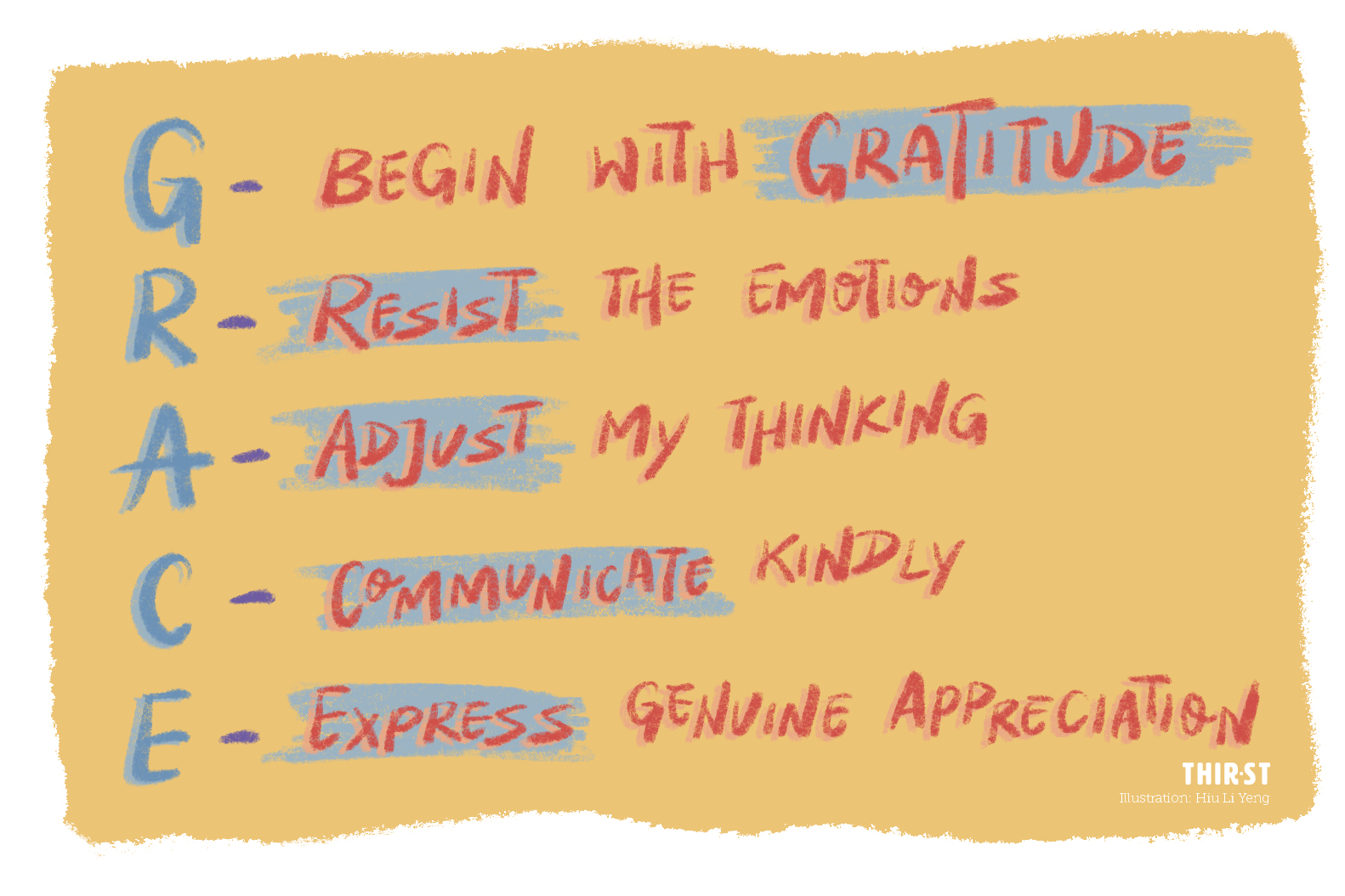COVID-19 is challenging for many, especially those who find being home difficult because of family situations.
Some might face parents who nag too much. Others might be the main breadwinner and caregiver for their parents. There are also those whose parents aren’t on good terms with each other, making every day feel like a warzone.
Personally, my mum’s mental illness has made each day pretty unpredictable. With all of us confined indoors, her mood swings have become more volatile and hard to manage. Keeping the peace at home has required me to be even more intentional in my words and actions.
On most days, this extra effort does get tiring. I often just want to do my own things and hole myself up in my room to watch Netflix.
But what I found really helpful was this handy acronym from Focus on the Family on how we can show G-R-A-C-E to our family. I’ll reproduce what each letter means below and elaborate on how I’ve tried to live it out in my family.

BEGIN WITH GRATITUDE
When I’m caught up in a stressful situation, like an argument with my mum, it can lead to pretty negative and judgemental thoughts about her.
I end up focusing on the way that situation made me feel, rather than the facts. While it may not seem like it in that situation, the family I’ve been born into is a blessing – that’s a fact.
I learned to stop holding myself and my family up to certain ideals and expectations.
The extra time I have at home with my family – my mum in particular – is a blessing as well. Even though every day isn’t ideal or perfect, each day is an opportunity to love and be there for her and my family in ways I wasn’t able to before.
Maybe our parents don’t act like “ideal parents”. But that doesn’t make them any less deserving of being honoured and loved by us.
I learned to stop holding myself and my family up to certain ideals and expectations. One practical way I did this was to limit my social media usage. Seeing other people’s seemingly picture-perfect household merely encouraged more unhealthy comparisons.
Instead, I try to be more present at home and focus on building up the relationships in my family.
RESIST EMOTIONS
Most of the time, arguments are triggered because of heightened emotions like anger or pride.
In the heat of the moment, my emotions can become hard to control and I end up reacting to the situation, so my anger and pride feel satisfied. But that only adds oil to the fire, so I’ve learnt to pause and respond to the situation instead.
The goal isn’t to be the one who’s right, but to love my family and show grace to them.
For example, when my mum upsets me, a reaction could be saying something to hurt her. But a response would be taking a moment to understand what’s upsetting her, before saying something productive that would help resolve the issue.
Responding instead of reacting is, for me, really about killing my ego and extending empathy. Some ways we can respond include letting go of grudges, not tracking how you’ve been wronged and being the first to say sorry.
I try to remember that the goal isn’t to come out on top and be the one who’s right, but to love my family and show grace to them.
ADJUST MY THINKING
When I first started dating, my church leaders advised us to separate the issue from the person during an argument. Similarly, I learnt to adjust my perspective at home so that I see the problem as what needs to be tackled – not my family.
This season affects my family as much as it affects me; I can be there for them instead of against them.
So I try to find opportunities to serve my family and ease the sources of anxieties I know I can tackle. For example, I know my mum gets stressed when she sees the kitchen in a mess, so I pay extra attention to make sure no dishes are left unwashed.
A bit of fun also goes a long way. Introduce your family to things you’re interested in, like doing a TikTok video or taking on the challenge of recreating childhood photos together!
COMMUNICATE KINDLY
Communication also plays a large role in keeping the peace at home.
I often assume my family “should know” what I mean (so I don’t have to explain anything). Turns out, despite having lived with them my whole life, my family still aren’t psychics.
Now, I’m not psychic either, so I can’t be too quick to assume I know what my family members are thinking.
Communication means understanding where your family is coming from, and helping them understand what your feelings and needs are.
Confirm and clarify.
Two Cs to remember for good communication are confirm and clarify. Ask questions like: “Did you mean this?” or “Is this okay with you?”
Be honest with your family so they understand your needs too. You could say things like: “I need a bit of time to relax because work was stressful today,” or “I appreciate you checking up on me, but I need a bit of space to work, please.”
Some red flags of bad communication include being dismissive, blaming one another and the use of critical language.
Phrases like “You’re not listening to me!” or “Whatever, I don’t care.” don’t lead to productive communication. They only stir up more anger and frustration.
EXPRESS GENUINE APPRECIATION
Giving grace takes humility. It will often mean appreciating and thanking the very people you’re feeling frustrated at.
But be the one to choose peace.
You could start by thanking your family for cooking even though they complained about doing it. Thank them for dabao-ing food even though they forced you to follow them, or thank them for buying groceries even though you’re the one who carried the groceries home.
A heart of gratitude goes a long way, and cultivating one will help you to become a person who soothes hurts and makes peace.
Your gratitude can be expressed beyond just words of affirmation. It can also be shown through acts of service, quality time, physical touch or gifts too (these are the five love languages).
Receive grace, patience and love from God first.
Showing grace is not easy. It takes a lot of intentional effort and can be tiring. Make sure to reach out to close friends, leaders or mentors whenever you need a listening ear or more.
And when you think you really have no grace, patience and love left to give, dive back into the presence of Father God. It’s important for you to receive grace, patience and love from Him first.
Give yourself time and space to take a breather and rest in the Father’s embrace. Plug in some earphones and listen to worship songs, or take a jog around your neighbourhood while praying (don’t forget your mask!).
Allow the Lord’s presence to minister to you and fill you up, then when you’re ready, give grace to your family once again.
If you need someone to talk to, the National CARE Hotline is open 24/7 with over 300 psychologists, counsellors and social workers ready to listen. Just call 6202 6868.
- How has living with your family been this season?
- G-R-A-CE. Which letters can you apply to be a peacemaker in your situation?
- What is one practical thing you can do this week to show grace to your family?
- Think of someone who may be in a difficult household. Reach out to them and be a vessel of God’s love and peace.









